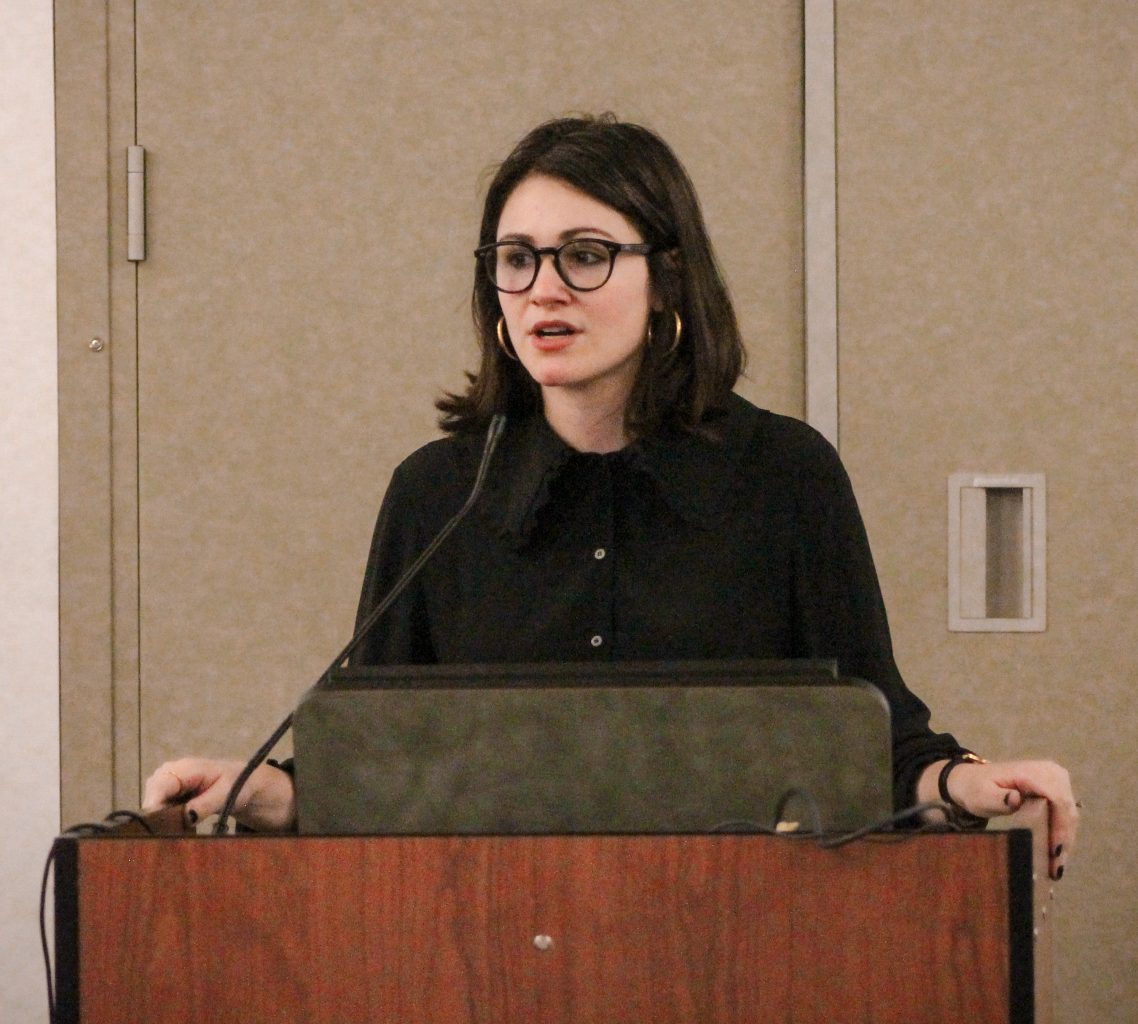Tanner Crunelle (Poetry, ’24) & Ellen Gwin (Poetry, ’24)
Our English Department has some amazing alumni. Jamie Carr, class of 2012, a literary agent for The Book Group, visited campus on Thursday, October 27th to speak with an audience of graduate and undergraduate students, faculty, and administrators. This visit was made possible by the Dorothea Benton Frank Writing Series, which brings well-known authors and publishing industry professionals to enrich the literary life of Charleston.

Born and raised in Lower Manhattan, Carr graduated from the College of Charleston with a B.A. in English in 2012. She then moved to Portland, where she earned an MFA in creative writing under the tutelage of Leni Zumas, the author of speculative fiction works such as Red Clocks. She felt taking this time was especially important for her own writing. “I sort of always loved reading and writing, and I wanted more time and space to be able to keep doing that, so I wound up moving to a really tiny MFA program in Portland, Oregon.” While an MFA student in Portland, Carr worked as an intern at Portland-based Tin House. After this experience, she wanted to be an editor. “When I was sitting around at table with people who were talking about books, thinking about books, taking books apart, putting them back together—that is when I was like, ‘Oh I want to work in publishing.’”
Upon moving back to New York with her aspirations to be an editor, Carr realized her real dream was to be “on the ground floor of books” as a literary agent. The secret life of books is indeed mysterious to many. It’s not as simple as moving a writer’s final draft from hard drive to bookshelf. Carr has seen firsthand how the publishing machine works.
She started in the Big Apple worming around the William Morris Endeavor talent agency. Her first job was in the mailroom. While there, she saw all facets of the publishing industry and was promoted to be able to buy her own projects. Now, as an agent for The Book Group, a woman-owned agency in Manhattan, her time is spent “juggling potential clients, reading manuscripts, prepping the author for submission,” and then, “selling it to a publisher.” There’s a lot of “zhuzhing” involved in publishing, Carr explained. To sell a work to editors at large firms, it must be explained strategically.
It’s essential for an author to get an agent if they are looking at big publishing houses. Carr explained why writers need agents saying, “Writers need agents because all of the big publishing houses do not take submissions unless they are through an agent.” The first contact with a publisher is often in a query letter. An author should be concise and direct, contact agents who represent books they like, and contact a small number of promising agents. Identifying relevant “comp titles” (abbreviation for “comparable titles”) in this stage is very important. The whole process should have the writer feel “empowered.”
At the end of Carr’s informative industry talk, she answered questions from the audience, emphasizing a sense of community. One student asked Carr if she would do anything different with her start in the publishing world. “I think in retrospect not being as nervous about [reaching out to people] and asking questions, and I wish I had talked more with everyone I met.” She also advised students to stay in touch with each other after completing the MFA. She has seen firsthand how former classmates can help with workshopping and professional networking even after graduation. Another student asked if a writer should change agents and editors each time they publish a new work. Carr answered, “Usually if there’s a really good relationship, most authors are with their agent for a while.” She did note, however, that “editors move around to different places.”
The MFA program also hosted an informal discussion with Carr over coffee. Questions ranged from literary genre to life in New York City as an agent, which she said suits her well. She spoke about the hard-won wisdom of maintaining the relationships built in a writing community, like at an MFA program. She had several relevant takes on how publishing is influenced by social media, social activism, and literary conventions revealed how publishing is, first and foremost, a business. It’s affected by people’s fractured attention spans and the rising cost of paper. However, Carr occupies a unique position. She explained how books fit into and, at times, challenge the market. With a commitment to accepting works by “marginalized voices,” Carr is the literary agent for poets like Tiana Clarke, fiction writers like Chloe Cole, and nonfiction authors such as Ella Dawson. She’s earning her stripes in the publishing world as a hardworking agent for a wide range of authors.
It takes a special person to advocate for art while also working in the business world. Jamie Carr makes us all proud to call ourselves CofC Cougars.
